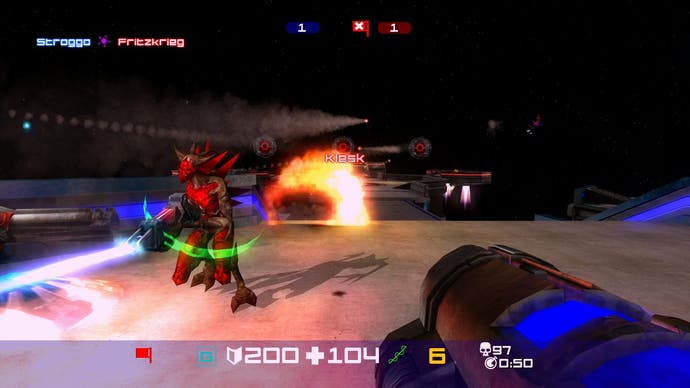Quake Arena Arcade
Rocket fool.
Quake III Arena, from which this Xbox Live Arcade port is derived, popularised many of the conventions and much of the terminology of the contemporary first-person shooter: everything from brown corridors to the term 'deathmatch'. And yet, sitting down with id Software's shooter concentrate 11 years after its debut, it's curious just how different a multiplayer experience it offers to its descendants.
That's partly thanks to its sheer speed. Quake Arena Arcade is all about split-second prediction-making. In Black Ops, rounding a corner into the arms of a foe is a game of who can squeeze the trigger first. But here, thanks to the speed at which players move, anticipation is more important than fight-or-flight reaction: firing a rocket ten metres to the left of an opponent who is travelling at breakneck speed in the hope that it will hit the target mid-sprint.
If Modern Warfare and Battlefield are about making opportunities and then taking shots, Quake Arena Arcade is about the science of expectation. It's a machine gun volley of estimation challenges, designed to test your foresight. Here, accuracy is only the second most important skill after twitch prophecy, and as a result, the game offers thrills of a different character to the modern FPS.
The purity of Quake Arena is reflected in its minimalist environments, the designers limiting decorative flourish to steel-riveted door frames and skirting boards imprinted with skulls. There are no props to distract or bespoke animations to interrupt, just a red-cloud sky over a suburb of hell.

These are bare-bones levels designed to churn players around in cyclical fashion, washing machine barrels filled with blood and BFGs. Their geography is drawn in until they are as tight as they can be without becoming cramped.
A mainstay of the professional multiplayer scene, Quake III Arena launched the careers of many of the e-sports thoroughbreds, from Jonathan 'Fatal1ty' Wendel to John 'Zero4' Hill. Again, it's the speed and anticipation the game requires that make it the perfect school for competitive play. Quake Arena Arcade could be seen as a training camp for the blockbuster FPS: spend two days within its confines and you'll emerge a better player, with honed skills that are transferable to other games.
At least, it would be a perfect training camp if anyone were actually playing the game. With leaderboard numbers measured in the low thousands, assembling a full room of 16 players requires not only patience but a sizeable dose of luck. Perhaps it's the dated visuals or the overpopulated genre. Either way, it seems few FPS players are returning to their genre's home for Christmas this year, and the game's community is lacking.








